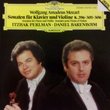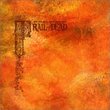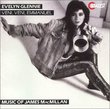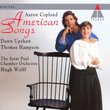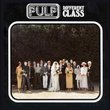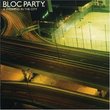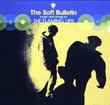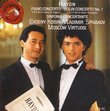| All Artists: Bach, Angela Hewitt, Richard Tognetti, Australian Chamber Orchestra Title: Bach - The Keyboard Concertos Vol 2 Members Wishing: 2 Total Copies: 0 Label: Hyperion UK Original Release Date: 1/1/2005 Re-Release Date: 6/13/2005 Album Type: Import Genre: Classical Styles: Chamber Music, Forms & Genres, Concertos, Historical Periods, Baroque (c.1600-1750), Classical (c.1770-1830) Number of Discs: 1 SwapaCD Credits: 1 UPC: 034571173085 |
Search - Bach, Angela Hewitt, Richard Tognetti :: Bach - The Keyboard Concertos Vol 2
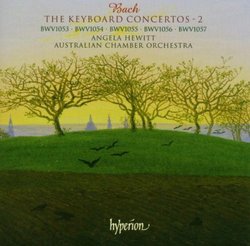 | Bach, Angela Hewitt, Richard Tognetti Bach - The Keyboard Concertos Vol 2 Genre: Classical
Angela Hewitt Performed and Recorded with the Australian Chamber Orchestra in February 2005, a Perfect Collaboration Resulting in Two Volumes of Bach Keyboard Concertos. |
Larger Image |
CD DetailsSynopsis
Album Details Angela Hewitt Performed and Recorded with the Australian Chamber Orchestra in February 2005, a Perfect Collaboration Resulting in Two Volumes of Bach Keyboard Concertos. Similarly Requested CDs
|
CD Reviews2006 Gramophone "Artist of the Year" Alan Lekan | Boulder, CO | 07/21/2005 (5 out of 5 stars) "Sometimes it is hard to decribe exactly what truly makes a great performance, but when many elements come together so splendidly as they do here, you immediately recognize it. These concertos are fresh and effervescent in every aspect - from Ms. Hewitt's delicate, poised articulations to the beautiful orchestral compliment from the ACO to the excellent Hyperion-engineered sound. Hewitt chose the Australian Chamber Orchestra after playing these works for many months with several orchestras around the world. Just hearing the first few bars of the first movement of the 6th concerto reveals how perfect Hewitt and the ACO are for each other and this music. The ACO's style and judgment are always in pefect compliment to Hewitt's playing - never overwhelming or underwhelming her gorgeous lines. If you prefer the more intimate dialog and effect of a smaller orchestra compared to the drama and power of a larger one, these performances should delight. There is a wonderful, chamber-like interaction and relaxed musicianship here that makes these performances rather irresistable and highly refreshing. Compared to other "reference" recordings, there is more of a carefree flow of tempo - and really charm - in the Hewitt/ACO performances which have a Spring-like freshness in their appeal. Hewitt's playing is both delicate but completely commanding at the same time and blends wonderfully with the feathery tones of the two flute soloists and Richard Tognetti's masterfully appealing violin interludes. All use modern instruments, yet retain appropriate period mannerisms with sonorities that are beautiful, enhanced by superb Hyperion sound engineering. While Miss Hewitt could easily take over with her powerful Fazioli Concert Grand, she use finesse and nuance to create a more gentle interaction with the lithe ACO. Having ten years of Bach recordings under her belt shows clearly in Hewitt's natural, at-one flow with the music - like she has penetrated the life within the music and just exudes it the most natural and intended manner like breathing. Her lines are sure and elegant and her ornamentations support the overall melody in the most delightful way that does not draw attention to the performer. Her bass 'flutters' are particularly appealing and inject nuances of artistry and excitement. This is music of top caliber and performances to be celebrated that have a timeless, ever-fresh quality that should wear well through the years. Such performances as this are one reason Miss Hewitt won the 2006 Gramophone "Artist of the Year" award. The music industry reviews of these July '05 releases were on the positive side overall. ClassicsToday gave both CD's glowing reviews and a perfect 10/10 for Artistry/Sound Quality with Gramphone giving both discs the highest "Gem" award. Sound quality is excellent with even the non-SACD sounding brilliant and without fault (perfect balance, clarity of solists and depth of tonal textures). And with these concertos, Miss Hewitt completes her decade-long Bach traversal with a grand crescendo. Note: Both discs are available in one set as well. A real winner. Compositions - 5 stars; Performance - 5 stars; Sound quality - 5 stars. " Reformed purist. J Koenigen | USA | 02/14/2006 (5 out of 5 stars) "When I first ran across these recordings, I dismissed them as another "romantic atrocity" commited against the music of Bach. While some period purists, myself usually included, would cry foul at the inclusion of a modern grand piano in these concerti, I think it useful to remember that Bach was not ignorant of the pianoforte and its capabilities. In 1747, Bach was invited to the Court of Prussian Emperor Frederick the Great at Berlin where he was asked to test out the Silbermann pianofortes (the pianoforte was invented in 1709. Bach's prowess on the instrument so impressed the Emperor, that he asked Bach to improvise on a subject of his (the Emperor's) own invention, from which came the Musical Offering. The modern piano is completely capable of overpowering a baroque chamber orchestra and to Hewitt's credit, she never exceeds the bounds of good taste and dignity by descending to the bombast that could potentially ruin this music and turn the soloist into the proverbial bull in a china shop. That is not to say that her interpretations are sterile and uninteresting; The very nature of the piano provides for a timbral and dynamic expressiveness unattainable on the harpsichord, and the soloist uses these effects to their best within the limits of the genre-conforming the piano to Bach and not Bach to the piano. The 5th Brandenburg concerto, while obviously not 'authentic' is played with such grace and deference to the music and the other soloists that it becomes a joy to listen to. The flautist and violinist in the Brandenburg and triple concerti as well as the flautists in the 5th concerto, although playing modern instruments, are nonetheless gracious in their interpretation, once again conforming their instruments and technique to the music and not the other way around. The Orchestra's performance is excellent. Though not perfoming on period instruments, they maintain the clear, precise timbre of a baroque orchestra. While the literal meaning of concerto may mean contest, the baroque concerto is less a contest and more of a cooperation of solo and orchestral forces than its romantic descendant which is almost a battle at times. The result is that neither soloist nor orchestra usurps the other's place in the music. In the end, This performance, while not a period performance, is definitely not a romantic interpretation either and deserves to be heard if for no other reason than that it is a new take on these musical gems." A new way to present a time honored treasure David Tan | New York, NY | 07/18/2005 (5 out of 5 stars) "This two set CDs of Bach's keyboard concerti surely brought Hewitt's discography to a new height. One relevant point is that Bach wrote these works for harpsichord, but as time and experience can tell, Bach survives through all transcriptions and applications of music instruments. This is a testimony that music is more important than form. I need to make this statement as most of listeners will agree with me that Bach rarely sounds so great as in this recording. Ms. Hewitt's playing is fluid and sensible, with reasonable pedal work added to bring sonority and legato at certain passages, but never overdone. Her passage works are well executed and clear, and her phrasings are subtle and convincing. In some parts, she made Bach extremely melodious. Australian Chamber supported the soloist with verse and a warm tone, with the concert master playing some counterparts commonly neglected in other performances. Another unique feature on this recording is that apart from the solo piano, there is a harpsichord playing continuo in the ensemble. The recording is well balanced and full of clarity. This set will bring fresh new delight and enjoyment for any Bach lovers.
" |

 Track Listings (15) - Disc #1
Track Listings (15) - Disc #1